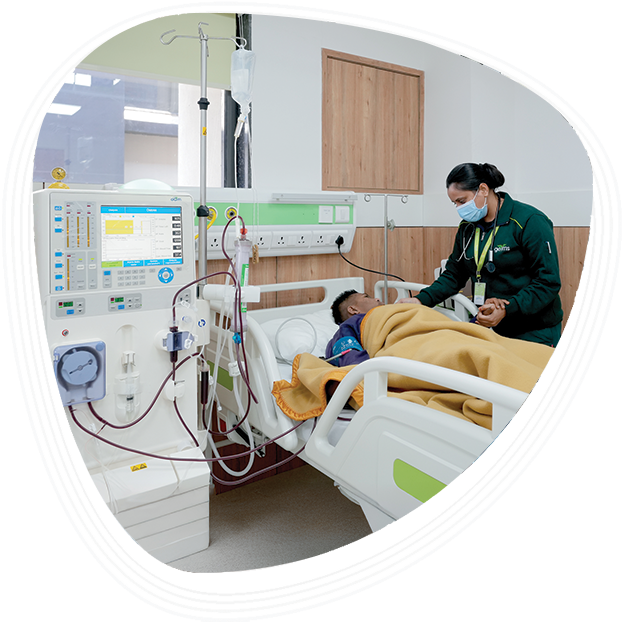When it comes to kidney health, seeking expert care is crucial for accurate diagnosis and effective treatment. Graphic Era Hospital has a team of some of the leading nephrologists in Dehradun, dedicated to providing comprehensive care for all types of kidney-related conditions. Whether you are dealing with chronic kidney disease, hypertension, or other renal disorders, our experienced team of nephrologists is equipped to offer personalized treatment plans tailored to your unique needs.
Doctors Available
What is a Nephrologist?
A nephrologist is a doctor specialising in diagnosing, treating, and managing conditions related to the kidneys and the urinary system, such as chronic kidney disease (CKD), acute kidney injury, kidney stones, hypertension (high blood pressure), electrolyte imbalances, and end-stage renal disease (ESRD). In addition, nephrologists also specialise in managing systemic conditions that affect the kidneys, such as diabetes and autoimmune disorders. With extensive knowledge of kidney function and its impact on overall health, nephrologists help patients maintain optimal kidney health and improve their quality of life.
Nephrology Expertise at Graphic Era Hospital
At Graphic Era Hospital, our nephrology department is dedicated to diagnosing, managing, and treating a diverse range of kidney-related conditions. With a patient-centred approach and cutting-edge medical technology, we deliver expert care to enhance kidney health and overall well-being. Our specialised services include General Nephrology, Critical Care Nephrology, Haemodialysis, Plasmapheresis, and Peritoneal Dialysis, ensuring comprehensive care for patients at every stage of kidney health.
1. General Nephrology
General nephrology involves the evaluation and treatment of a broad spectrum of kidney diseases. These include:
- Chronic Kidney Disease (CKD): A progressive condition requiring early detection and long-term management.
- Acute Kidney Injuries (AKI): Sudden loss of kidney function that demands immediate intervention.
- Kidney Infections, Stones, and Genetic Disorders: Conditions like Polycystic Kidney Disease (PKD), which require specialised care.
At Graphic Era Hospital, our nephrologists utilise advanced diagnostic tools to ensure precise assessments. Tailored treatment plans, including medication, lifestyle counselling, and dietary modifications, are designed to preserve kidney function, prevent complications, and improve quality of life.
2. Critical Care Nephrology
For critically ill patients, nephrology care in intensive care settings is essential. Our specialised critical care nephrology services address:
- Acute Kidney Failure: Often caused by sepsis, severe infections, or trauma, requiring urgent treatment.
- Electrolyte Imbalances: Life-threatening disturbances in sodium, potassium, and other minerals.
- Multi-Organ Failure Complications: Advanced care for patients with complex medical conditions affecting kidney function.
Our nephrologists work closely with ICU specialists to deliver timely, coordinated care, employing the latest techniques to improve survival rates and outcomes in high-risk scenarios.
3. Haemodialysis
Haemodialysis is a life-saving treatment for patients with end-stage kidney disease. At Graphic Era Hospital, we have FDA approved B. Braun Dialog Plus and Fresenius 4008S dialysis machines, enabling us to provide advanced haemodialysis services for both adults and children. The services include:
- Tunneled Cuffed Dialysis Catheter Insertion: With both anterograde (old catheters) and retrograde catheter.
- Sustained Low-Efficiency Dialysis (SLED): A hybrid dialysis modality that provides gentle, prolonged toxin and fluid removal for critically-ill patients.
- Comfortable and Safe Environment: Our dialysis units are designed for patient comfort and safety, ensuring stress-free procedures.
- Ongoing Monitoring: Regular evaluations to optimise dialysis effectiveness and adjust treatments as needed.
We are committed to enhancing the quality of life for patients requiring dialysis while focusing on their long-term health goals.
4. Hemodiafiltration
We provide advanced Hemodiafiltration services, integrating diffusion and convection for superior toxin removal and fluid balance in patients with kidney failure. This technique offers enhanced clearance compared to traditional hemodialysis, ensuring optimal patient outcomes.
5. Plasmapheresis
Plasmapheresis is a specialised procedure for managing immune-mediated kidney disorders. It involves:
- Filtering Harmful Substances: Removing abnormal antibodies, immune complexes, and toxins from the blood.
- Treating Autoimmune Conditions: Effective for conditions like lupus nephritis and vasculitis that impact kidney function.
- Preventing Critical Complications: Ensuring stabilisation in patients with severe kidney involvement.
Our skilled team at Graphic Era Hospital employs advanced plasmapheresis techniques to ensure precision, safety, and successful outcomes.
6. Peritoneal Dialysis
Peritoneal dialysis offers patients a flexible, home-based alternative to haemodialysis. Our nephrology team provides comprehensive services for peritoneal dialysis, including:
- Dialysis catheter insertion and Continuous Ambulatory Peritoneal Dialysis (CAPD)
- Option for Automated Peritoneal Dialysis (APD)
- Comprehensive training for patients and caregivers to perform dialysis safely at home.
This option allows patients greater freedom while maintaining high standards of care.
How Autoimmune Diseases Impact Kidneys
Autoimmune conditions like LUPUS Nephritis, ANCA vasculitis, anti GBM Disease, IgA Nephropathy can cause significant damage to the kidneys, leading to inflammation or scarring of the delicate tissues. This disruption can impair kidney function and, if left untreated, may progress to chronic kidney disease.
Nephrologists play a crucial role in diagnosing and managing these complex conditions. Using advanced diagnostic tools and targeted therapies, they aim to reduce inflammation, limit damage, and preserve kidney performance.
At Graphic Era Hospital, our nephrologists collaborate with specialists across multiple disciplines to provide a comprehensive approach to autoimmune-related kidney care. This ensures that patients receive personalised, effective treatment for improved outcomes and overall well-being.
How Cardiovascular Diseases Impact Kidneys
The connection between your kidneys and your heart is vital. Cardiovascular conditions such as heart failure or coronary artery disease often affect kidney function and vice versa. Fluid retention, blood pressure imbalances, and poor circulation can strain both organs.
Our nephrologists in Dehradun understand this intricate relationship and develop treatment plans that address both kidney and cardiovascular health. By doing so, they aim to enhance your overall quality of life.
How High Blood Pressure (Hypertension) Impacts Kidneys
Uncontrolled high blood pressure is a leading cause of kidney damage. Conversely, kidney diseases can also contribute to rising blood pressure. Nephrologists play a key role in breaking this cycle by identifying the underlying causes and implementing effective treatment strategies.
At Graphic Era Hospital, our kidney specialists provide personalised plans to manage hypertension, combining medication with lifestyle changes to protect your kidneys and your heart.
When to See a Nephrologist?
Early detection of kidney problems is crucial for effective treatment and maintaining long-term kidney health. Many symptoms of kidney issues are subtle or easily overlooked, but addressing them promptly can prevent serious complications. If you notice any of the following signs, it’s time to consult a nephrologist:
Swelling in the Legs, Feet, or Around the Eyes:
Persistent swelling, known as oedema, is often a result of fluid retention caused by improper kidney function. This can indicate underlying conditions like chronic kidney disease or nephrotic syndrome.
Persistent Fatigue or Weakness:
Kidneys play a vital role in filtering waste and producing hormones that regulate energy levels. If your kidneys aren’t functioning properly, you may feel unusually tired or weak, which could be a sign of anaemia or toxin buildup in the blood.
Unexplained Changes in Urination Patterns:
Noticeable changes in frequency, colour, or volume of urination—such as excessive urination, reduced output, or foamy urine—can signal kidney dysfunction or urinary tract issues.
Blood in Urine (Haematuria):
Blood in the urine, whether visible or detected during a lab test, is a red flag for potential kidney stones, infections, or more serious conditions like glomerulonephritis.
Family History of Kidney Disease:
A genetic predisposition to kidney problems increases your risk. Consulting a nephrologist early can help with monitoring and preventive care to avoid potential complications.
Recurring Kidney Stones or Infections:
Frequent kidney stones or urinary tract infections can damage the kidneys over time. A nephrologist can provide specialised care to prevent recurrence and protect kidney health.
Why Timely Action is Important
Ignoring these symptoms can lead to severe complications such as chronic kidney disease, kidney failure, or life-threatening electrolyte imbalances. Early diagnosis and intervention are critical to managing these issues effectively.
At Graphic Era Hospital, our nephrologists provide expert guidance, advanced diagnostic tools, and tailored treatment plans to address these problems with care and precision. Don’t wait—your kidneys deserve the best care possible.
Diseases and Conditions Treated by Nephrologists in Dehradun
At Graphic Era Hospital, our nephrologists are experts in diagnosing and managing a wide range of kidney-related diseases and conditions. By combining advanced diagnostic tools, cutting-edge treatments, and personalised care, we ensure that every patient receives the highest quality of kidney care. Below are some of the key conditions we treat:
Chronic Kidney Disease (CKD)
CKD is a long-term condition where the kidneys gradually lose their ability to filter waste and excess fluids from the blood. This progressive disease requires ongoing management, including regular monitoring of kidney function, lifestyle modifications, and medical treatment to prevent further decline. Our nephrologists focus on slowing the disease's progression, managing complications, and improving patients' quality of life.
Kidney Stones
Kidney stones are hard mineral deposits that form in the kidneys and can cause severe pain, blood in urine, and urinary blockages. At Graphic Era Hospital, we provide comprehensive care for kidney stones, including preventive strategies, medical treatments, and advanced procedures like lithotripsy or minimally invasive surgery to remove larger stones. Our specialists also guide patients on dietary and lifestyle changes to prevent recurrence.
Acute Kidney Injury (AKI)
AKI is the sudden loss of kidney function, often caused by severe dehydration, infections, or exposure to harmful substances. This condition requires immediate attention to prevent long-term damage. Our nephrologists are skilled in identifying the underlying cause and providing prompt treatment, which may include fluid replacement, medications, or dialysis in severe cases.
Diabetic Nephropathy
Diabetes is a leading cause of kidney damage, and diabetic nephropathy occurs when high blood sugar levels harm the delicate filtering units of the kidneys. Managing this condition involves strict blood sugar control, blood pressure regulation, and kidney-protective medications. Our team works closely with endocrinologists to provide an integrated approach to managing diabetes and kidney health.
Polycystic Kidney Disease (PKD)
PKD is an inherited disorder that causes fluid-filled cysts to develop in the kidneys, potentially leading to kidney failure. Nephrologists at Graphic Era Hospital provide specialised care to manage symptoms, slow cyst growth, and monitor complications like high blood pressure or infections. In advanced cases, our team coordinates care for dialysis as needed.
Electrolyte Imbalances
Kidneys play a vital role in maintaining the balance of electrolytes such as sodium, potassium, calcium, and phosphate in the blood. Imbalances can lead to serious complications, including irregular heart rhythms and muscle weakness. Our nephrologists identify the root cause of these imbalances and offer targeted treatments to restore and maintain proper electrolyte levels.
Nephrotic Syndrome
Diseases causing heavy proteinuria can lead to generalised body swelling usually diagnosed as Nephrotic Syndrome. Diseases causing Nephrotic Syndrome like Minimal Change Disease, FSGS, Membranous Nephropathy, Amyloidosis, Myeloma are usually diagnosed by a nephrologist using invasive and non-invasive diagnostic tools.
Why Choose Graphic Era Hospital for Kidney Care?

What Types of Tests and Procedures Does a Nephrologist Perform?
Nephrologists rely on advanced diagnostic tools and specialised procedures to accurately diagnose, treat, and monitor kidney conditions. These tests and treatments are crucial for assessing kidney function, identifying abnormalities, and providing personalised care plans for each patient. At Graphic Era Hospital, our nephrologists perform the following key tests and procedures:
Blood and Urine Tests
- Blood Tests: These include tests like serum creatinine, blood urea nitrogen (BUN), and glomerular filtration rate (GFR) to evaluate how well the kidneys are filtering waste from the blood. Abnormal levels indicate impaired kidney function or ongoing damage.
- Urine Tests: Urinalysis and 24-hour urine collection help detect protein, blood, or other substances in the urine, which can signal kidney infections, damage, or chronic kidney disease.
These tests are the foundation for diagnosing kidney conditions and monitoring disease progression or response to treatment.
Imaging Tests
Nephrologists use imaging techniques to visualise the structure of the kidneys and surrounding organs:
- Ultrasound: A non-invasive procedure to identify kidney stones, cysts, or structural abnormalities.
- CT Scans: Detailed cross-sectional images of the kidneys that help detect tumours, blockages, or complications from kidney stones.
- MRI and Doppler Imaging: For assessing blood flow to the kidneys and identifying vascular issues affecting kidney function.
Imaging tests allow nephrologists to pinpoint the cause of symptoms and plan effective interventions.
Kidney Biopsies
When more detailed information is needed, a nephrologist may recommend a kidney biopsy:
- A small tissue sample is taken from the kidney using a specialised needle, guided by ultrasound or CT.
- The sample is analysed under a microscope to diagnose conditions such as glomerulonephritis, autoimmune diseases, or unexplained kidney failure.
Biopsies provide precise information about the severity and cause of kidney conditions, enabling targeted treatment strategies.
USG-Guided Native and Transplant Kidney Biopsy
A minimally invasive procedure using ultrasound guidance to assess kidney disease or transplant health.
- High-accuracy tissue sampling for kidney evaluation.
- A safe & minimally invasive procedure, performed under real-time ultrasound guidance for patient safety.
This technique helps detect kidney disorders, rejection in transplant cases, and guides treatment decisions.
Nephrology Conditions Treated at Graphic Era Hospital
Other Specialities
Patient Stories
Blog
Frequently Asked Questions (FAQs)
Which doctor is best for kidney health?
A nephrologist is the best specialist to consult for kidney-related health concerns. They are experts in diagnosing, managing, and treating kidney diseases, including chronic kidney disease, kidney stones, and conditions like diabetic nephropathy. At Graphic Era Hospital in Dehradun, our team of experienced nephrologists is dedicated to providing world-class kidney care tailored to your needs.
At what stage of kidney disease should you see a nephrologist?
You should see a nephrologist as soon as you are diagnosed with kidney disease, regardless of its stage. Early consultation allows for timely intervention, which can slow the progression of kidney damage. Individuals with risk factors like diabetes, high blood pressure, or a family history of kidney disease should consider regular nephrology check-ups even before symptoms appear.
What are the three warning signs of kidney disease?
Common warning signs of kidney disease include:
- Changes in urination: Reduced frequency, dark or foamy urine, or blood in the urine.
- Swelling (oedema): Swelling in the legs, feet, or around the eyes due to fluid retention.
- Fatigue or weakness: Caused by anaemia or the accumulation of toxins in the body.
If you notice any of these symptoms, it’s crucial to consult a nephrologist promptly.
What is the difference between a nephrologist and a urologist?
While both nephrologists and urologists deal with the urinary system, their areas of expertise differ:
- Nephrologists: Specialise in kidney health, including kidney diseases, dialysis.
- Urologists: Focus on the urinary tract and male reproductive system, treating conditions like kidney stones, urinary infections, and prostate issues.
If your concern is specifically related to kidney function, a nephrologist is the appropriate specialist to consult.
How do I check if my kidneys are functioning well?
To assess kidney health, you can undergo the following tests:
- Blood tests: Measure creatinine levels and calculate the glomerular filtration rate (GFR) to evaluate kidney function.
- Urine tests: Detect protein, blood, or other abnormalities in the urine.
- Imaging tests: Such as ultrasounds, to check for structural abnormalities or blockages.
Consulting a nephrologist will ensure you receive the appropriate tests and expert guidance.
When should I see a nephrologist?
You should see a nephrologist if you:
- Have persistent symptoms such as swelling, fatigue, or changes in urination.
- Are diagnosed with diabetes or hypertension, as these are leading causes of kidney disease.
- Have a family history of kidney problems.
- Experience recurrent kidney stones or urinary tract infections.
Early consultation can prevent complications and help maintain optimal kidney health.
What is the normal creatinine level?
Normal creatinine levels vary slightly depending on age, gender, and muscle mass:
- Men: 0.7 to 1.3 mg/dL
- Women: 0.6 to 1.1 mg/dL
- Children: 0.5 to 1.0 mg/dL
Elevated creatinine levels may indicate reduced kidney function and should be evaluated by a nephrologist.












